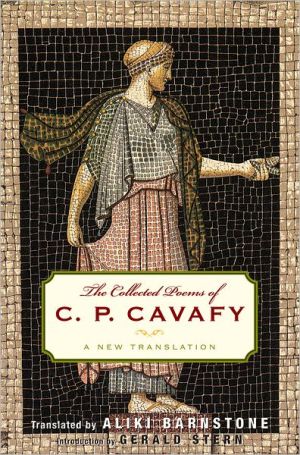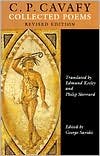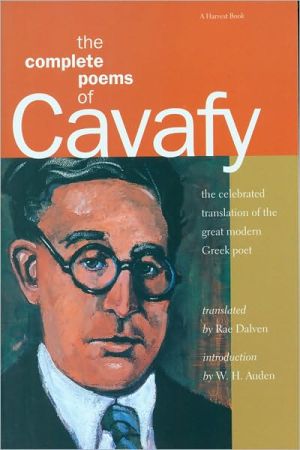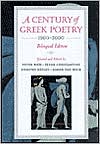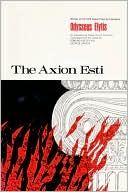The Collected Poems of C. P. Cavafy: A New Translation
C. P. Cavafy (1863-1933) has written some of the most powerful poems in history. His work uncannily translates history, the record of the many, into an individual personal document. Though Cavafy is wickedly satirical, many of his poems are located in a landscape of intimacy. Drawing on the spectrum of ancient Greek poetic tradition, his poetry is still internal, whether his speaker is a spoiled rich boy who plans to enter politics or a poor, ostracized, pure and beautiful young man destroyed...
Search in google:
A new translation of a poet widely considered one of the most important of the twentieth century. The Washington Post - Michael Dirda At its best, his mature work hardly seems poetry at all. (Marguerite Yourcenar once likened his short pieces to reading notes or aides-memoires .) Cavafy prefers nouns and avoids epithets, uses rhyme sparingly if at all, offers lots of historical or physical detail, and typically casts a poem as a dramatic monologue. Even his titles are oddly prosaic, though touched with a kind of shabby grandeur: "A Byzantine nobleman in exile composing verses" or "The melancholy of Iason Kleandros, poet in Kommagini, 595 C.E." In fact, Cavafy gains most of his power, as the Greek poet George Seferis insists, when we view his work as "one and the same poem" and "read him with the feeling of the continuous presence of his work as a whole.
Foreword Gerald Stern xviiAcknowledgments xxvIntroduction: C. P. Cavafy: Eros and History as Prophesy xxix1896Julian at the Mysteries 31897Walls 5An Old Man 6The Horses of Achilles 71898Prayer 8The Funeral of Sarpedon 91899Candles 11The First Step 121900When the Watchman Saw the Light 13The Enemies 141901Che Fece...Il Gran Rifiuto 15The Souls of Old Men 16Interruption 171903The Windows 18Thermopylae 19Growing Strong 201904September, 1903 21December, 1903 22January, 1904 23On the Stairs 24At the Theater 25Disloyalty 26Waiting for the Barbarians 28Voices 30Desires 311905Trojans 321906King Dimitrios 331907Antony's Ending 34TheProcession of Dionysos 351908Hidden Things 36Monotony 371909This Is the Man 38The Footsteps 391910The City 40The Satrapy 411911The Ides of March 42Finished 43A Sculptor from Tyana 44The God Abandons Antony 45Ionian 46The Glory of the Ptolemies 47Ithaka 48On Hearing of Love 50The Dangers 511912Philhellene 52Herodis Attikos 53Alexandrian Kings 54Come Back 56In Church 571913Very Rarely 58As Much as You Can 59For the Shop 60I Went 61"I Will Tell the Rest to Those Down in Hades" 62Like This 631914Exiles 64The Tomb of Lysias the Grammarian 65The Tomb of Evrion 66Chandelier 67Far Off 681915The Wise Sense What Is to Come 69Theodotos 70At the Cafe Door 71He Swears 72As I Lounged and Lay on Their Beds 73One Night 74Morning Sea 75Drawn 761916Orofernis 77The Battle of Magnesia 80Manuel Komninos 82The Displeasure of the Selefkid 83When They Are Aroused 85In the Street 86Before the Statue of Endymion 871917In a City of Osroini 88Passing Through 89For Ammonis, Who Died at Twenty-nine, in 610 90One of Their Gods 91Evening 92Sensual Pleasure 93Gray 94The Tomb of Iasis 95In the Month of Athyr 96I Have Gazed So Long 97The Tomb of Ignatios 98House with Garden 99Days of 1903 100Half an Hour 101The Tobacco Shop Window 1021917 or 1918Remember, Body... 103The Tomb of Lanis 104Meaning 1051918Kaisarion 106Nero's Term 108Envoys from Alexandria 109Aristovoulos 110In the Port 112Aimilianos Monai, Alexandrian, 628-655 C.E. 113Since Nine O'Clock 1141919Outside the House 115The Next Table 116The Bandaged Shoulder 117The Afternoon Sun 118Imenos 119Of the Jews (50 C.E.) 120To Stay 121Of Dimitrios Sotir (162-150 B.C.E.) 122On the Ship 1241920If Truly Dead 125Young Men from Sidon (400 C.E.) 127So They Will Come 129Dareios 130Anna Komnini 1321921A Byzantine Nobleman in Exile Composing Verses 133Their Beginning 134The Favor of Alexandros Valas 135The Melancholy of Iason Kleandros, Poet in Kommagini, 595 C.E. 136Dimaratos 137I Brought to Art 139From the School of the Celebrated Philosopher 140A Craftsman of Wine Bowls 1421922Those Who Fought for the Achaian League 143To Antiohos Epifanis 144In an Old Book 1451923In Despair 146From the Drawer 147Julian Seeing Indifference 148Epitaph of Antiohos, King of Kommagini 149Theater of Sidon (400 C.E.) 1501924Julian in Nikomedia 151Before Time Changed Them- 152He Came to Read 153In Alexandria, 31 B.C.E. 154Ioannis Kantakouzinos Triumphs 1551925Temethos, Antiochian, 400 C.E. 156Of Colored Glass 157The Twenty-fifth Year of His Life 158On an Italian Shore 159In the Boring Village 160Apollonios of Tyana in Rhodes 1611926The Illness of Kleitos 162In a Township in Asia Minor 163The Priest of Serapeion 164In the Bars 165A Grand Procession of Priests and Laymen 166A Sophist Leaving Syria 167Julian and the Antiochians 1681927Anna Dalassini 169Days of 1896 170Two Young Men, Twenty-three to Twenty-four Years Old 171Greek since Ancient Times 173Days of 1901 1741928You Did Not Know 175A Young Man, an Artist of the Word, in His Twenty-fifth Year 176In Sparta 177Portrait of a Twenty-three-Year-Old Man, Painted by His Friend the Same Age, an Amateur 178In a Large Greek Colony, 200 B.C.E. 179A Prince from Western Libya 181Kimon, Son of Learhos, Twenty-two, Student of Greek Letters (in Kyrini) 182On the March to Sinopi 184Days of 1909, '10, and '11 1861929Myris: Alexandria, 340 C.E. 187Alexandros Iannaios and Alexandra 190Beautiful White Flowers Became Him 191Come, O King of the Lacedaimonians 193In the Same Space 1941930The Mirror in the Front Hall 195He Asked about the Quality 196They Should Have Cared 1981931According to the Recipes of the Ancient Greco-Syrian Magicians 200In 200 B.C.E 2011932Days of 1908 2031935In the Suburbs of Antioch 205A Note on the Transliteration of Names 207Notes 209A Note on the Text, Selection, and Order of the Poems 255A Biographical Note on Cavafy 257Index of Titles and First Lines 260
\ Andrei Codrescu“Cavafy’s simplicity, learning, pleasure in sex, tranquility in exile, have healed our anguish for over a century. . . . Cavafy’s deeply cultured melancholy and praise of learning and the body flow unimpeded in Barnstone’s translations.”\ \ \ \ \ Michael DirdaAt its best, his mature work hardly seems poetry at all. (Marguerite Yourcenar once likened his short pieces to reading notes or aides-memoires .) Cavafy prefers nouns and avoids epithets, uses rhyme sparingly if at all, offers lots of historical or physical detail, and typically casts a poem as a dramatic monologue. Even his titles are oddly prosaic, though touched with a kind of shabby grandeur: "A Byzantine nobleman in exile composing verses" or "The melancholy of Iason Kleandros, poet in Kommagini, 595 C.E." In fact, Cavafy gains most of his power, as the Greek poet George Seferis insists, when we view his work as "one and the same poem" and "read him with the feeling of the continuous presence of his work as a whole.\ — The Washington Post\ \ \ Library JournalThis new translation brings Cavafy into the 21st century, creating "something refined and polished" but entirely accessible, too. Copyright 2006 Reed Business Information.\ \
